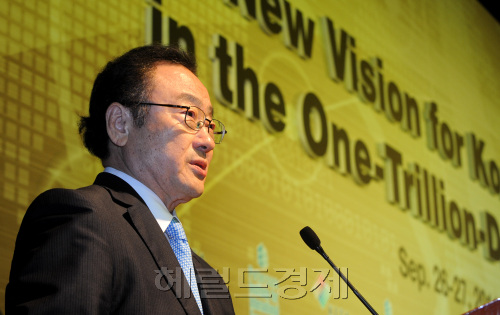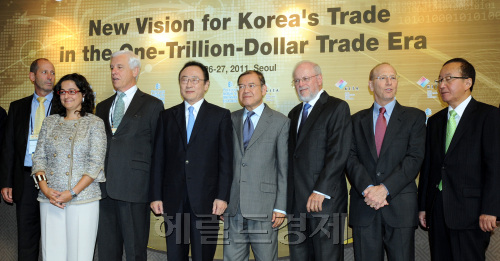Trade volume growth sets important precedent for developing nations
South Korea’s trade volume reaching $1 trillion is a miracle that has significance not only for Korea but for developing countries, Korea International Trade Association chairman SaKong Il said Monday. With Korea’s trade volume, including exports and imports, expected to surpass $1 trillion won this year, Korea is set to become the ninth country in the world to achieve the milestone.
Speaking at the conference organized in collaboration with the Peterson Institute for International Economics to mark Korea’s entering of the “$1 trillion trade era,” SaKong said that Korea’s growth is an important precedent that has implications beyond Korea.
“In 1964, the country designated as Export Day when exports rose above $100 million, and at the time the main export items included tungsten and squid. Less than 50 years later not only have our trade reached $1 trillion but include automobiles and other high tech items. It can only be described as a miracle,” SaKong said.
“The milestone shows what trade can do for poverty-stricken countries and it sends an important message about escaping poverty. In particular, it highlights the importance of free trade.”
South Korea’s trade volume reaching $1 trillion is a miracle that has significance not only for Korea but for developing countries, Korea International Trade Association chairman SaKong Il said Monday. With Korea’s trade volume, including exports and imports, expected to surpass $1 trillion won this year, Korea is set to become the ninth country in the world to achieve the milestone.
Speaking at the conference organized in collaboration with the Peterson Institute for International Economics to mark Korea’s entering of the “$1 trillion trade era,” SaKong said that Korea’s growth is an important precedent that has implications beyond Korea.
“In 1964, the country designated as Export Day when exports rose above $100 million, and at the time the main export items included tungsten and squid. Less than 50 years later not only have our trade reached $1 trillion but include automobiles and other high tech items. It can only be described as a miracle,” SaKong said.
“The milestone shows what trade can do for poverty-stricken countries and it sends an important message about escaping poverty. In particular, it highlights the importance of free trade.”


According to KITA, the value of Korea’s exports for the first eight months of the year came in at $368.8 billion, while that of imports came to $347.8 billion putting the total at just above $700 billion. The figure for exports is the seventh largest in the world, and that makes Korea the world’s ninth largest importer.
“At the end of August, the target was 70 percent achieved, so we expect that it will be possible to achieve $1 trillion trade volume this year,” SaKong said.
Regarding the question of whether the country will be able to maintain the momentum next year, SaKong said that as Korea has diversified its trade partners in recent years, the country would be able to offset the effects of the global economic uncertainties.
“At present, more than 70 percent (of Korea’s trade volume) is with developing countries. As they will continue to growth faster than developed nations, I think it will be possible next year also,” SaKong said.
However, he said that the country needs to achieve a more balanced export portfolio if it is to continue growing in the future.
“Korea needs balanced growth, and for this we need to focus on the service industries. While Korea ranks ninth in terms of exports, the country is 14th in terms of exports from the service sector.”
Experts attending the conference also said that the free trade agreements Korea has been forming as part of its long-term growth strategy will also play an important role in maintaining the momentum.
“Korea’s trade has not hit a wall, but it is facing a situation where the demand in key markets have slowed, therefore greater efforts need to be made to maintain market share,” Peterson Institute of International Economics’ senior fellow Jeffrey Schott said. He added that he is optimistic that the trade pact between Korea and the U.S. will be approved in the U.S. within next month.
“The FTA with the EU and hopefully the passage of the KORUS FTA at the beginning of next year, both of these along with trade agreement with other important markets will provide additional impetus for growth.”
Such sentiments were echoed by SaKong who said that the benefits the Korea-U.S. FTA would bring were well recognized by all those concerned.
“I am optimistic that the national assemblies of the two countries will ratify the pact in October,” he said.
“The reason (for being optimistic) is that the majority of Korean citizens support the pact, and the citizens and the politicians alike are well aware of the economic effect of the free trade agreement.”
Regarding the current economic situation, SaKong said that the situation is different from past economic crises in that advanced countries are at the center of the current problems, making the situation more difficult to address.
“The problem is an economic one, but from a wider perspective, it can also be viewed as a crisis of political leadership,” he said. He added that the global economic landscape has transformed into one that includes several economic powerhouses, making it difficult for one country to take the lead.
“As such, the global economy has to rely on collective leadership, and it is the G20 that can give rise to collective leadership. I do not think the system has failed, but I do expect more, and it would have been better if the recent communiqu provided more detail, but preparations could be made in the run up to the Cannes summit.”
By Choi He-suk (cheesuk@heraldcorp.com)


















![[Today’s K-pop] Treasure to publish magazine for debut anniversary](http://res.heraldm.com/phpwas/restmb_idxmake.php?idx=642&simg=/content/image/2024/07/26/20240726050551_0.jpg&u=)